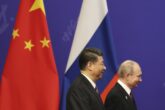March 09, 2021
All Politics Is Personalized
As February’s Conservative Political Action Conference (CPAC) fades from the news, one image still sticks in the mind: Throughout the convention, a larger-than-life golden statue of former U.S. President Donald Trump graced the merchandise hall.
Some have called the installation a perfect metaphor for the state of the Republican Party. Since leaving office, Trump has nonetheless continued personal attacks on prominent members of the party, including Senate Minority Leader Mitch McConnell, while pressuring others within the party to censure, condemn, and purge party leaders who he sees as disloyal—all on-brand for a president who, over his four years in office, sought to steadily increase his own power and influence relative to others in the Republican Party.
Leaders are amassing more power relative to their political parties so politics more strongly reflects the leader’s preferences rather than being a bargaining process among multiple actors and institutions. If the trend continues, liberal democracy will suffer.
The personalization of political parties isn’t unique to the United States. All around the world, democratic politics is increasingly becoming a personal affair; leaders are amassing more power relative to their political parties so politics more strongly reflects the leader’s preferences rather than being a bargaining process among multiple actors and institutions. If the trend continues, liberal democracy will suffer.
Political science has long seen personalism as a problem in authoritarian settings. And since the end of the Cold War, there has indeed been a decisive shift toward personalism in autocracies. Leaders such as Russian President Vladimir Putin, Turkish President Recep Tayyip Erdogan, and Nicaraguan President Daniel Ortega have steadily concentrated power from parties and institutions to themselves. Even in China, President Xi Jinping has bucked decades of consensus-style decision-making, wrangling power away from the Chinese Communist Party and into his own hands.
Read the full article from Foreign Policy.
More from CNAS
-
Transatlantic Security / Securing U.S. Democracy Initiative
Respect Umpires — on the Field and in the CourtroomCongress shouldn’t let the administration’s contempt slide. None of us should....
By Will Rogers
-
Republicans Saved Democracy Once. Will They Do It Again?
Despite different political and historical contexts, the playbook these personalist leaders use to dismantle democracy has been identical....
By Andrea Kendall-Taylor, Joseph Wright & Erica Frantz
-
Exploiting Russian Weakness
Introduction Russia’s full-scale invasion of Ukraine has created ripple effects that extend well beyond Ukraine’s borders. Reverberations from the war have been particularly p...
By Nicholas Lokker & Andrea Kendall-Taylor
-
How Personalist Politics is Changing Democracies
This rapid increase is alarming: Personalist rule brings with it a host of negative outcomes compared to other types of authoritarian systems....
By Andrea Kendall-Taylor, Carisa Nietsche, Erica Frantz & Joseph Wright




